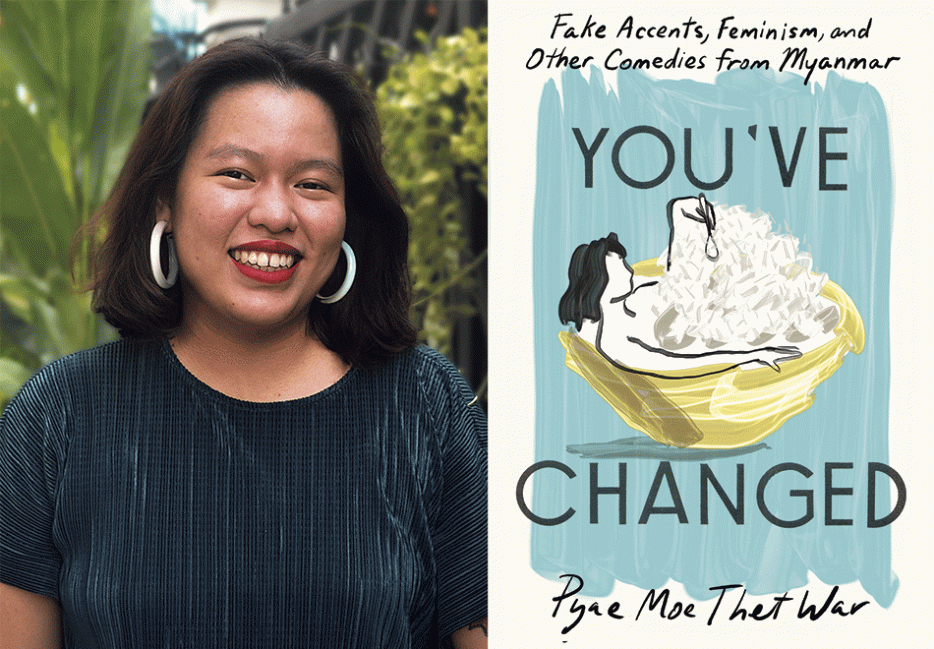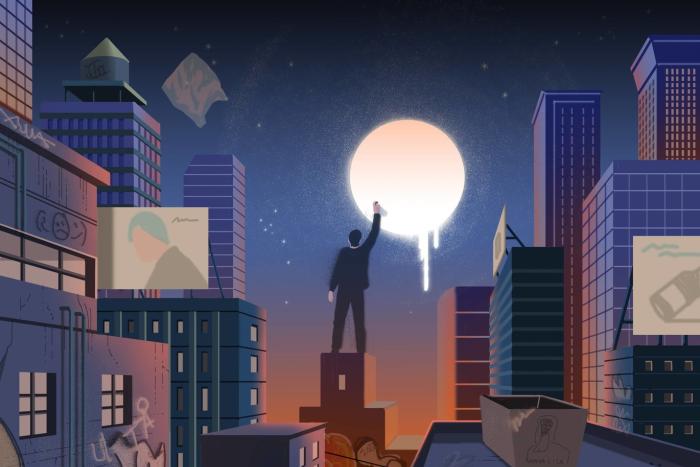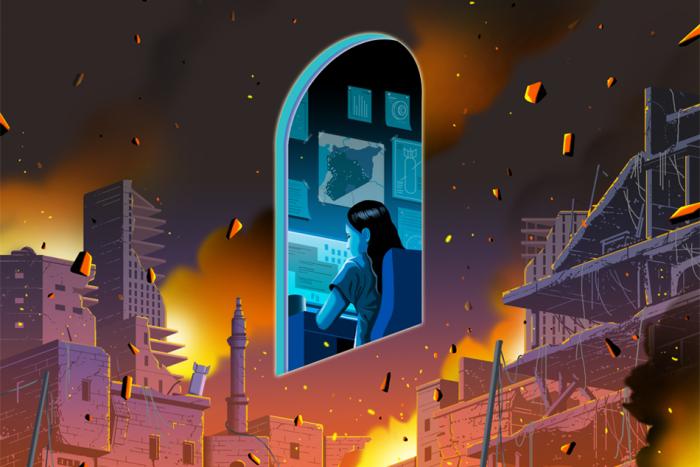"How many accents is it normal to have?" It’s a question I avoid considering too closely, because between my American missionary education, a coming-of-age (and then some) in the U.K., and my Indian family and friends, the best description of my speech is: a mess. A mess best ignored, at that.
But when my first book came out—a process involving public events, podcasts, and BuzzFeed videos—I felt, for the first time, the pressure of consistency. I needed to sound like the same person, irrespective of who I was speaking to or where I was. In other words: would the real accent please stand up? Frustratingly, though, there was no real accent, no singular authentic self. My multitudes speak differently, and so, in the end, I settled for the voice that made me feel confident, projected intelligence, and which I believed lent me the most authority (but also the safety of distance, as a young woman writing about sex in India). No prizes for guessing that this accent was British.
In You’ve Changed: Fake Accents, Feminism and Other Comedies from Myanmar (Catapult), Pyae Moe Thet War writes: “Speaking from experience, if I had to make a list of the top five things about myself that have served me the most throughout my life, my American accent could very easily rank number one.”
For Pyae, born and raised in Myanmar with university degrees from the U.S. and the U.K., the question of accents is also a question of privilege and perception. She writes that in comparison to her boyfriend’s supposedly “sexy” native British speech, or her friends’ “stylish” French or Italian voices, “no one’s ever described a Myanmar accent as sexy, or if they have, I certainly haven’t come across such an account.”
From switching accents to passport privilege, from baking a “perfect platter of fudgy brownies” to never cooking Myanmar cuisine, the essays in Pyae Moe Thet War’s debut collection are engaging, spirited, and fast-paced accounts of what it means to be a Myanmar woman today—both inside and outside her country’s borders. Resisting easy categorization and drawing us into the author’s multiple worlds and lives, You’ve Changed candidly explores the many ways we navigate identity in a world whose mainstream culture is dominated by the West.
As for accents?
When Pyae first moved to the U.K., “people were very quick to point out that . . . Brummies sounded different to Scouses who sounded different to posh Etonians.” She goes to write: “When people ask me to do a Myanmar accent, I ask them what they think a Myanmar accent sounds like, and they say, ‘I don’t know, like, a Chinese one?’ But shame on me for thinking that all Brits sound the same.”
Richa Kaul Padte: In You’ve Changed’s opening essay, “A Me by Any Other Name,” you reference writing the essay’s first draft in 2012 when you were a teenager in college. You also talk about revisiting things you’ve written since the age of seventeen. I can’t imagine even re-reading, forget actively using, anything I wrote at that age! What does this process look like for you?
Pyae Moe Thet War: Two things help me keep track of everything I’ve ever written: I only write digitally, and I don’t believe in the delete button, at all. I also just love building on my past work. I don’t know if this is true for all writers, but my brain has a tendency to subconsciously put a pin in the pieces that (for whatever reason) it’s particularly attached to. The opening essay is a great example because that was a piece that I’d rewritten and pitched multiple times to different outlets over several years but no one ever took it (thank god!). But I just knew in my gut that it was special and that I loved it so much, and so I just kept holding onto it and periodically revising it until it found its perfect home. And I’m not always aware of what pieces of writing I’m subconsciously holding onto until something will trigger a memory, and then I go into my archives and dig it back up; and it’s the best feeling when I’m now looking at it with fresh eyes and I’m like, “Wow I’m so glad I didn’t delete this because I didn’t know how to make this better back then but I absolutely do now.”
Wow, this is very inspiring to me, as I am a very chaotic notebook-writer with even worse digital organization systems. But I do sometimes glimpse memories of writing and ideas I have lost to this mess, so maybe our conversation is the kick into organization I need! I’m probably getting sidetracked here, but do you use hard drives or cloud storage for all this archiving? I’m very curious about what writers do with their stuff, like, where does it live?
I am terrified of losing projects so I do pay extra to have them all backed up onto two separate cloud storage systems. I don’t do this with first/second/third drafts, but if a project is in its final stages, I’ll also email the latest version to myself. For books, I have separate folders for projects that are in the actual manuscript stages, but snippets of drafts are just floating around. I feel like I lied a little bit when I referred to my mess of a cloud storage folder as an “archive.” In my mind, archiving is meticulously organized, like a library. What I’ve done is more akin to getting a giant box with a very secure lid and just throwing everything in there; and it might take me a while to dig up something old, but I always know that it’s somewhere in the box. Does that metaphor make sense?
Yes! It makes perfect sense, and is also kind of reassuring because I do think I can manage a massive, disorganized box.
You write: “For a long time, my only creative goal was to have a stranger read my writing without once realizing that I wasn’t white.” It was a process of erasing context and specificities—names, places, foods—where, “instead of lying, I just left it all out.” The flip side, you explain, is that now, many years into a public writing career, “Every time I write something that doesn’t have to do with skin whitening creams or my grandmother’s curry . . . I’m terrified that my writing has lost its one appealing trait.” Has this second fear supplanted the first, or have they sort of intermingled? (Or, disappeared all together?)
I try to just push that aside altogether, and, almost paradoxically, the way I do that is to let both of those fears coexist. I say this literally all the time, but these days, I write for myself—which is something that I didn’t always do, hence my many fears about how others would perceive my writing. But—and I feel like this is a cliché but it’s so true—at the end of the day, the only thing you have control over when you’re putting your work up for public consumption is the writing. People have asked me how I know when something is good enough to be published or how I overcome these fears of what other people will think, and my answer is that if I like it and I think it’s good and I enjoy reading it, then that’s all that I need. It’s also all I can do that’s entirely in my power.
There’s this other aspect of writing marginalized identity that you explore with wonderful honesty: “There was an ugly knot in my stomach that . . . another Myanmar writer, especially . . . another young, female Myanmar writer, would put their book out on submission at the same time as me. . . . Am I allowed to say that? Does that break some sort of code of solidarity among writers of colour?”
I loved this, because we’re constantly told, especially online, to replace a “scarcity mentality” with an “abundance mentality.” But the reality of, say, the publishing statistics that you reference in your book, is that there is only a very tiny room for marginalized people that we are implicty or explicitly competing for. I don’t know if you’ve read Zakiya Dalila Harris’ novel The Other Black Girl (it’s great!), but your words about the “other” imagined Myanmar writer really reminded me of Harris’s work. Do we perhaps need to reimagine solidarity in a way that recognizes scarcity rather than forces us to pretend at abundance?
Yes, definitely! It’s okay to say “Hey, doesn’t it suck that it feels like we’re being forced to compete for so few spots?” It’s a really tricky line to walk, and I hate that the onus is on writers like ourselves to walk it; it’s also why I personally don’t like to think of these perspectives as “mentalities,” because I feel like doing so shifts the conversation to an It’s all in your head context. It takes a lot of privilege to say that it’s not a competition, and blindly pushing that narrative just sweeps these actual issues and inequalities under the rug. And it’s also a form of gaslighting, if you ask me. I specifically reference statistics because otherwise someone could try to tell me that I’m being irrational or dramatic or that there’s “room for everyone” or whatever, but the stats explicitly state otherwise. It’s like, we know it’s not a competition, but it sure does feel like it a lot of the time!
And that aforementioned privilege could be in the context of race or gender or socioeconomic class or even where you are in your career. Now that I’m a published author, it’s easier for me to step back from this competition mentality, but that absolutely wasn’t the case just two years ago when we were going out on submission—and that’s something that I try to keep in mind when I talk to younger, unpublished writers. I’m like, “This is the reality of the situation. Try to not think of it as a competition, but also know that it’s normal if those feelings do creep up. It sucks! I know! We’re trying to change it!”
You talk at various points about returning to Myanmar with a deeper understanding of feminism, thanks in part to your time spent at universities in the U.S. and the U.K. I wonder if you ever experience it the other way too? That is, bringing the perspectives and learnings of Myanmar feminism and women’s movements to Western feminist thought? I’m curious, because for me, even ten years after moving out of a white country, this remains the harder learning, the bigger task.
I’ve always noticed a respect for mothers and grandmothers in Myanmar culture that you don’t really find in Western cultures. Yes, of course you love your mom and you celebrate Mother’s Day and stuff, but for Myanmar people, there’s this deference and recognition that this woman literally gave you life, that you are on this planet because you came out of this woman—and I don’t really see that in American or British culture.
Additionally, I am ambivalent towards marriage, but if I were to ever get married, I cannot fathom changing any part of my name. Obviously it’s a personal preference, and it’s not inherently an anti-feminist decision to take your male spouse’s last name, but if my potential white fiancé got bothered by my not taking his last name, I’m not even quite sure how I’d bring it with up with Mom and Grandma because it would sound ridiculous to them that that’s even a point of contention.
I will also say that I try not to view these different ideas and perspectives as contrasting, or to “pit” them against one another, which is easier said than done. When I was writing [the essay] “Laundry Load.” I absolutely worried that I was arguing that one perspective was “better” than another. What helped was a conversation with my friend Khin where I was confessing precisely this and about how I didn’t feel comfortable talking about “American” (or Western) feminism versus “Myanmar” feminism. She pointed out that my feminism and feminist thoughts were just that: my feminism and feminist thoughts and ideologies, and they were a mix of everything I’ve encountered thus far in life (as opposed to strictly “Myanmar” feminism or “Western” feminism). And that was so freeing to realize because she was absolutely right.
I love how you explore the ways that names intersect with power. The name Burma was the product of British imperialism, and post-independence, the country was renamed Myanmar. It was, you write, a “shedding of . . . colonial history,” but also an act “by a new military government. . . . What better way to assert your power than by literally changing an entire name?”
This really speaks to what is happening in India right now: a renewed drive towards renaming cities, streets, monuments, and airports to more Hindu-ized words. This is claimed as a rejection of British colonization, but in reality, it’s a set of actions by a right-wing Hindu government intolerant of diversity. How do you balance acknowledging the devastating brutalization of colonization with what are often equally harmful post-colonial governments? Especially when your readership is directly descended from colonizers, and still reaping imperialism’s rewards? Asking, um, for . . . a friend.
I really appreciate this question because I think that a lot of white, Western readers don’t necessarily pick up on that specific conflict, because it is admittedly easier to view it as a more straightforward dichotomy when, as you say, it’s . . . not. I’m still trying to figure this out myself, but the best answer that I have is that you do acknowledge that simultaneous struggle, and you kind of never stop acknowledging it. You can’t simply overlook one side; to do so would be to ignore the historical and present complexities of our country (or countries!), and while it might be simpler to posit one approach as “better,” it’d also be inaccurate. Like 99.9% of life, stuff like this isn’t black-and-white, and I’m not sure if it’s even possible to strike a “fair” balance when talking about these topics, but it’s imperative that you’re recognizing that there are multiple discussions to be had and it’s not a clear-cut “one side clearly has the moral high ground” situation.






